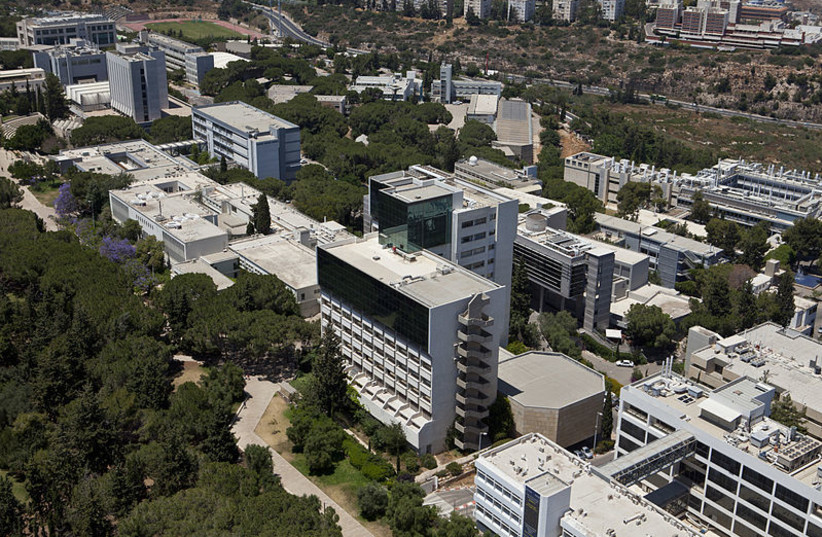TEL AVIV — Eosinophilic esophagitis, a chronic immune disease caused mainly by food allergies, is a serious condition affecting about one in 2,000 children. Yet it’s very difficult to diagnose.
That’s because it traditionally requires a highly trained pathologist to analyze biopsies under a microscope — an arduous, time-consuming process that sometimes yields different results depending on who is doing the analysis.
But what if a machine scanned the biopsies instead, and got the diagnosis right every time?
An inconceivable fantasy only 20 years ago, it’s no longer science fiction — thanks to a unique new partnership between the Technion-Israel Institute of Technology in Haifa and Cincinnati Children’s Hospital Medical Center in Ohio.
Known officially as the Bridge to Next-Generation Medicine, the academic venture, launched in September, aims to revolutionize pediatric medicine by combining the Technion’s technological prowess, including world-renowned expertise in computational science and artificial intelligence, with doctors and scientists focused on understanding and treating childhood diseases.

The hope is that together they will come up with new ways of diagnosing and treating pediatric illnesses.
“It’s an exciting partnership that brings together people who normally wouldn’t work together — particularly computer scientists with computational biologists, and pediatric scientists focused on better understanding of treating the diseases of childhood,” said the chief visionary behind the partnership, Dr. Marc Rothenberg, director of Children’s Hospital’s Division of Allergy and Immunology.
For example, when it comes to eosinophilic esophagitis, a microscopic evaluation by a doctor might take 20 or 30 minutes. But a computer could do it automatically and work 24/7, and it continually learns.
With the new partnerships between the Technion and Cincinnati Children’s, the analysis could take place within minutes of procurement of the microscopic slide, and it can happen across large distances — in this case, the Atlantic Ocean.
Marrying science with big data, in particular, can help unleash a toolbox to solve unmet global pediatric needs, ranging from ultra-rare diseases to common ones such as asthma, cancer and autism, according to Rothenberg.
“Research has become much more complex and involves big data sets,” Rothenberg said. “By having approaches that involve expertise in computational science and AI — which is a strength of the Technion — we can apply these to understanding diseases in ways that are revolutionary.”
A world expert on inflammatory diseases, Rothenberg came up with the idea for the partnership while on a sabbatical at the Technion and its associated hospital, Rambam, also in Haifa.
Two Israeli scientists, professors Yonatan Savir and Shai Shen-Orr, will head up the project on the Technion side.
Savir specializes in harnessing artificial intelligence for health applications. Among other things, his lab at the Technion developed unique algorithms to remotely monitor patients for COVID-19 symptoms.
“My lab is unique because we have people doing molecular biology together with those with a background in engineering and computational biology,” Savir said. “Our underlying basic research goal is to understand how biological systems age and fail. The aging process is so complicated, and there are so many moving parts.”
Machine learning and AI can do a variety of things for medicine, Savir explained. For one thing, AI can help physicians make better decisions based on current biomarkers — molecules found in blood, tissues or body fluids that suggest some kind of abnormality or can help determine how well a body is responding to a certain kind of treatment. AI can also reveal biomarkers that otherwise are not readily apparent.
“In the last few years, more and more clinics have the ability to scan slides of biopsy images, and biopsies are one of the main tools we have for diagnostics,” Savir said.
Shen-Orr leads the immunology and precision medicine lab at the Technion’s Rappaport Faculty of Medicine. Among other things, he co-founded CytoReason, an AI-driven company that collaborates with some of the world’s biggest drug companies, including Pfizer and Sanofi.
“Generating big data in biology is not a problem anymore. You can now sequence a genome for less than $1,000,” he said. “But you basically understand only 5-10% of the genome. The problem is getting insight. That’s where computer science comes in, and machine learning is just one approach.”
The Technion is Israel’s foremost academic incubator for high-tech startups. University officials hope that the partnership with the Children’s Hospital will help what is already one of America’s leading hospitals become a vector for Israeli companies working on medical applications.
At present, the partnership between Technion and the Cincinnati hospital involves about 20 researchers at the Technion. As requests for proposals go out, officials expect possible areas of collaboration to grow, including such areas as development of stents and other biomedical devices.
Cincinnati’s Children’s Hospital was established in 1931 as the nation’s first pediatric research institution and consistently ranks among the best children’s medical facilities in the United States. The partnership with Technion was announced at an online event in September.
“But we are not a university, so we don’t have the strengths the Technion has in technology,” Rothenberg said in an interview. “We think this is a unique partnership, and we hope the only limit will be the amount of funding we’re able to raise.”
This story was sponsored by and produced in collaboration with the American Technion Society. To learn more or make a gift for this initiative by two world-class institutions joining powers to unlock the potential of big data to transform child health, please call Joey Selesny at (248) 593-6760 or visit ats.org/contact. This article was produced by JTA’s native content team.
